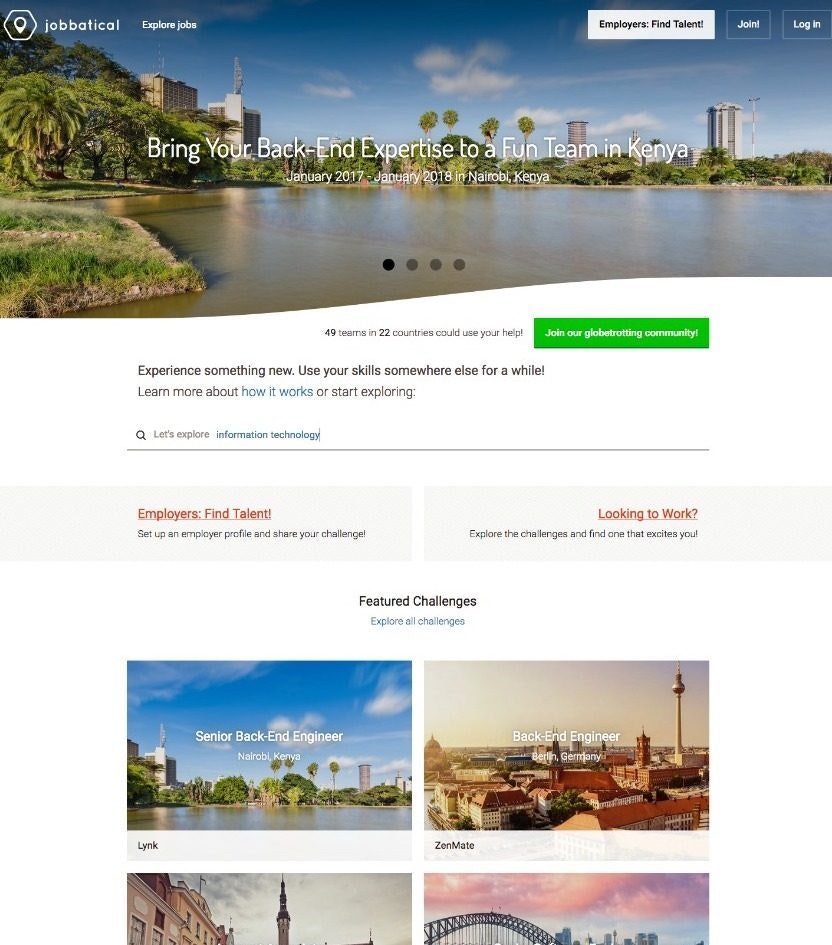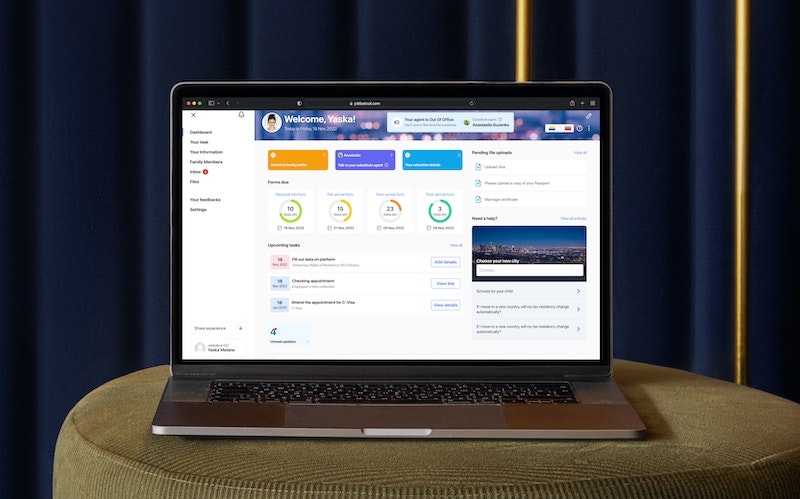In 2018, the global recruitment platform I founded had half a million users and had helped people in 53 countries find jobs in their dream destinations. We’d raised £8m worth of investor cash and for the most part, things seemed good — the customers liked the product, the team were happy and the investors were satisfied.
But a few months later I decided to change almost every element of the business — a move that took our trajectory from steady to hockey-stick growth.
Here’s why I’m an advocate for pivoting when things are good — and the lessons I learned from doing so.
Are you really focusing on the right thing?
The idea for Jobbatical was to create more Silicon Valleys around the world — in places like Tallinn, Helsinki and Lagos — by making it easier for people to live and work globally.
My first stab at solving this problem was to create a cross-border recruitment platform — essentially an Airbnb-style platform for jobseekers with an appetite to live and work overseas. It made it easier for job-seekers to browse roles worldwide, and for scaling companies to find talent for positions they were struggling to fill domestically.

But three years in, the thing we were hearing from our business customers was that the real barrier to borderless hiring wasn’t in the recruitment of global talent but in the painfully slow bureaucracy and visa-related paperwork once the job offer had been accepted.
In Q1 of 2018, just under two years into the business, we began offering a relocation service as a bonus product for existing customers. At the time it was essentially an Excel sheet. We worked out we could speed up the visa process by digitising and automating the majority of the paperwork and thinking about improving the process from the perspective of the person who was relocating.

While we did absolutely nothing to market our relocation service, word quickly spread among talent-hungry companies and by midway through 2019, our side business was bringing in 40% of our total revenue despite absorbing just 7% of our total company costs.
The penny dropped: we’d been focusing on the wrong thing.
Gut feeling + data
I knew in my bones this was the right decision for Jobbatical — but if you’re going to pivot when things are good you need to back up your decision with data.
Because the relocation service was already a part of our main business (albeit a small part), we had two years of data, and the revenue, to prove this was an increasingly needed service. We also looked to global talent shortages to prove that this problem wasn’t going away.
But to turn it into our main product would require convincing our investors and the board that we needed to burn £6m of the £8m we’d raised — and turn our back on four years of graft. Thankfully, our investors were on side from day one. Their portfolio companies were all struggling with talent shortages and relocating talent from countries like India and the Philippines, where there is a talent surplus, made total business sense. They were all in need of a product like ours.

In 2019 we used around £2m of the £8m we’d raised to build out our new global relocation platform and despite the pandemic-shaped curve balls, we ended 2022 having helped more than 6,000 employees and their families move to 19 countries.
We’d figured out a way to make international relocation 2x faster at 3x lower cost than the services offered by the Big Four accountants (PWC, Deloitte, KPMG and EY), which typically work within the confines of the old world of immigration. In an effort that was initially motivated to improve the experience for our existing customers, we’d accidentally become experts in visa and relocation, building a product that reimagined how immigration could work better for people on the move.
We had found our hockey stick — we’d onboarded globally scaling customers like Personio, N26, Twilio and TravelPerk and we grew our monthly recurring revenue growth 8x in 12 months. In April 2023, we announced our launch in the US, UK and France.
Become comfortable with the idea of pivoting
Making any radical change to your business model is hard, because it means giving up all the blood, sweat and tears that you and your team have put in. And as a founder, it can feel like a failure. It requires letting go of a vision and journey that you wholeheartedly advocated for and convinced your team and investors to follow you on. Pivoting affects everyone in the business and as CEO you need to find a way to set aside your ego and make the right choice for the company.
While our pivot was definitely on the more extreme side, tech is full of companies that have adapted and evolved to find their market fit. On sharing the news, an investor from Union Square Ventures told me that just 20% of the businesses in their portfolio were selling the same product they’d started with.
Questions for pivot-tempted founders
- Do you really have product-market fit?
When and whether to pivot ultimately comes down to product-market fit, and the harsh truth is if you’re wondering whether you have a market fit, you probably don’t. With our recruitment product we were always wondering, whereas with Jobbatical 2.0 we were absolutely certain and had the data to back it up.
- Are you ready to have hard conversations?
Dramatically changing a business often pushes you to make decisions you’d rather not.
The year of our pivot, 98% of our team were based in the recruitment business we were about to kill, and we subsequently had to let go of 30% of the team that had worked so hard and to whom we owed so much. It wasn’t easy, it broke my heart, but it was a decision I had to make.
Even if you manage to keep your team, there will no doubt be tough conversations to follow with your existing customers, investors or perhaps even the family and friends who have stood by you during the early years.
- Clean slate vs rebrand?
We continued with our existing name and company and communicated the pivot to our existing customers. We’d built up trust and credibility as Jobbatical in the HR space working with recruiters, so converting early-stage B2B customers was easier than starting from scratch.
Having to explain the changes to stakeholders for months after the pivot, however, did slow down important conversations and put pressure on customer support teams who were having to turn unknowing B2C customers away.
Having spoken to other founders who have pivoted, it’s also worth considering starting with an entirely clean slate — a new name, a new brand, a new business. Ultimately the route you choose comes down to what will get you running the fastest: is there a clear route to funnel existing customers into your new venture? How would you do it again if you had an entirely clean slate?
- Are you prepared to start again?
Taking a leap comes with risks and there’s always a chance it won’t work out or growth will be much slower than you’d anticipated. Pivoting is humbling, because while you’re armed with a wealth of learnings from your earlier journey, in many ways you’re starting again.
Dialling your team back or closing the door or a huge segment of your user base can be difficult to swallow initially. But it’s taught me to do a lot with little and has made the team far more resilient.




